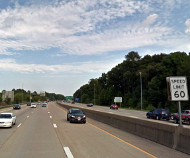3/16/2018
Motoring Group Asks Feds To Stop Funding Ticket TrapsNational Motorists Association urges NHTSA to refuse speed trap funding to cities that fail to adhere to federal speed limit regulations.

Speed trap towns should not get money from Uncle Sam if they are not following the rules. That was the argument the National Motorists Association made in a letter urging officials at the National Highway Traffic Safety Administration (NHTSA) to stop bankrolling ticketing operations in jurisdictions that fail to adhere to federal standards designed to ensure speed limits are appropriate.
"Speed limits posted below Federal Highway Administration (FHWA)-recommended levels are dangerous, creating differential speeds in traffic flow that accentuate conflicts between drivers who travel safely with the prevailing flow of traffic and those who abide by the posted limit, even when it is well below the recognized norm," NMA president Gary Biller wrote to acting NHTSA chief Heidi King. "Braking, accelerating, quick lane changing, and irritated drivers become commonplace in these situations which creates conditions contrary to the government's role of protecting the safety of the public."
The group cited the findings of Virginia traffic engineer Joe Bahen who has completed a number of traffic studies on roads in the commonwealth that fail to comply with FHWA standards.
The group has, for example, been trying to stop the Virginia State Police from running a NHTSA-funded speeding ticket blitz on a five-mile stretch of Interstate 64 in Newport News. Just as the road widens from six to eight lanes, the speed limit drops from 65 MPH to 60 MPH. The road has a design speed of 70 MPH and was posted at 70 MPH prior to the imposition of the 55 MPH speed limit in the 1970s.
Under state law, the Virginia Department of Transportation (VDOT) may not lower a speed limit unless that action is "prescribed after a traffic engineering investigation" (see Virginia Code Section 46.2-878). VDOT has no study to back up the speed limit reduction. Using FHWA's speed limit formula, the highway should be posted at 70 MPH.
"An 'appropriate speed limit' is one that is realistic and credible, one that has been lawfully established pursuant to an engineering study conducted by a licensed professional engineer using sound engineering principles and the national FHWA traffic engineering standards that Virginia adopted in 1979," Bahen explained.
NHTSA grants represent a significant source of income for Virginia. Last year, the state collected $21 million from NHTSA, $5.4 million of which was used to pay officers overtime while manning speed traps.
A copy of the NMA letter is available in a 1.4mb PDF file at the source link below.


